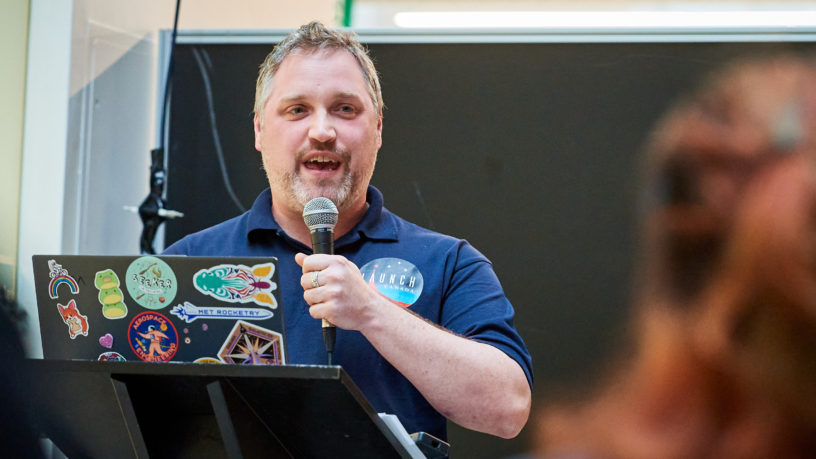By Lillie Coussée
Photos by Sammy Kogan
Toronto Metropolitan University (TMU) held Canada’s first-ever student rocketry conference at the Centre for Urban Innovation on March 16 from 9 a.m. to 5 p.m.
The event was hosted in collaboration with Met Rocketry, TMU’s student club dedicated to designing, building and launching rockets.
The event was held in partnership with Launch Canada—a Canadian grassroots rocketry organization created a couple of years ago to expand rocketry in Canada, give students opportunities to work with industry professionals and compete in Canadian aerospace competitions, according to its website.





TMU’s conference had a similar objective. Wintta Ghebreiyesus, current PhD candidate studying aerospace engineering who is also a former member of Met Rocketry and chaired the university’s student rocketry 2024 conference—said the team is trying to get more people involved with rocketry in the country.
“Our goal is to bring together the rocketry community across Canada,” she said.
Ghebreiyesus said having this conference at a university allows other institutions, experts and the public to participate in promoting the advancement of rockets in Canada.
Met Rocketry was founded in 1997. Team captain and graduate student studying aerospace engineering Ahmad Zain Aldeen, said a student engineering team gives members an opportunity to utilize the skills they learn in the classroom and apply them to real life.
Students who join the team only learn various software and math, while also partaking in hands-on opportunities.
“We give [students] workshops, even if it’s not actually building the rocket. We give them something to learn, which [are] things that they don’t usually learn in courses,” said Aldeen. “It’s nice to have people come to our university and see what we do firsthand.”
Canada is seeing the beginnings of an entirely new space launch industry—a sector of the aerospace industry dedicated to the process of launching rockets into space—said Adam Trumpour, the founder and CEO of Launch Canada when speaking at the conference.
“I want everybody to appreciate just how big a deal this is,” he said.
Trumpour said just a couple of years ago that an event like this would be unthinkable. This is because historically, Canada was not involved in the building or launching of rockets. Yet, this is rapidly changing, mainly because of the work students are putting in, he said.
“Student rocket teams have really been leading the charge on developing Canadian rocket capabilities,” he said.
Bao Tran, propulsion project manager for Met Rocketry and third-year aerospace engineering student at TMU, said the team’s main goal is to spark a “rocket revolution.”
He said rocketry in Canada is very small compared to the U.S., so he hopes this event will prove TMU is a rocketry school and that it encourages rocketry for other Canadian teams as well.
“I hope [people] recognize that rocketry is not just some small thing. It’s actually a very important thing that we should include in our school,” he said.


Every year, the team builds a new rocket and showcases their project at competitions in the summer, said Aldeen. This year will be the first time they are going to the Launch Canada competition in August and will launch a two-stage rocket—a device that separates in the air after the fuel runs out and then eventually re-launches.
Alanna Paniccia joined Met Rocketry in her first year at TMU. The now second-year aerospace engineering student and interdisciplinary specialist on Met Rocketry said the skills she learned from the team are invaluable.
“Putting the academics into practice and being able to have that deeper understanding…and just being in that team environment, I find is something you don’t get just by going to classes.”
She hopes Met Rocketry will be able to put their name out there and show people they can compete with other big-name engineering schools.
“To have our own conference, [we’re] bringing all these industry professionals here,” she said. “Look at what our school does, our school is up there too.”










Leave a Reply